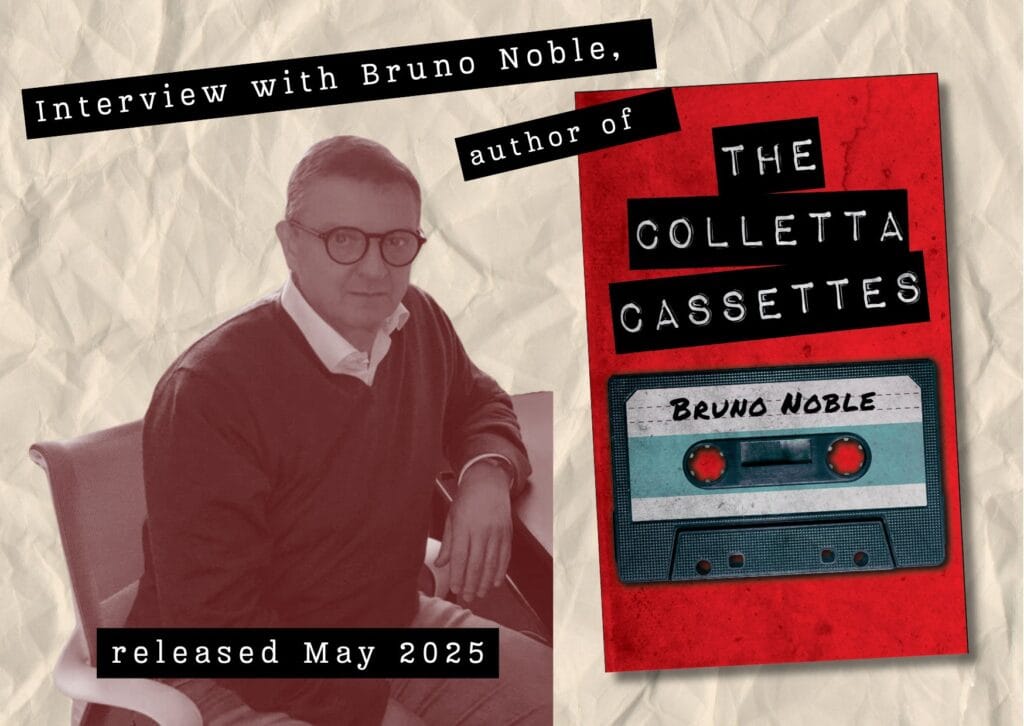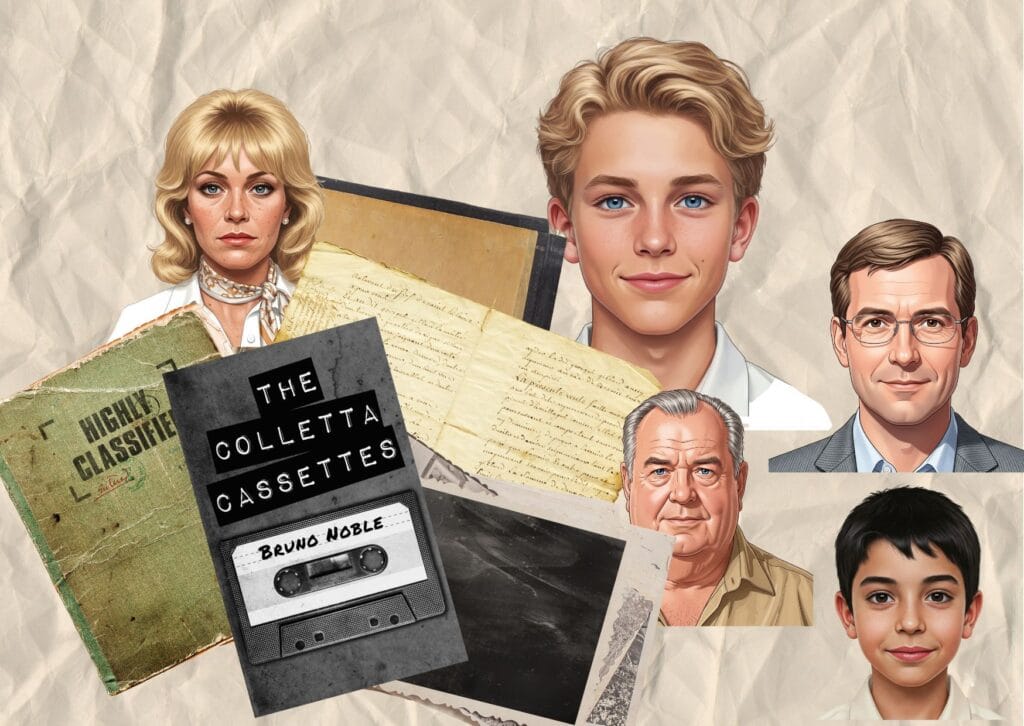
This month’s Book Club pick is one of our own – about time too! The Colletta Cassettes, by Bruno Noble, released in May. The book is about the Kentish Family, who are on holiday in Colletta, a small medieval village in the hills of Liguria, Italy. It’s 1978 and the football World Cup is on, fueling feverish rivalry between the various nationalities enjoying a bit of Italian dolce vita. 16-year-old Sebastian falls in love for the first time, much to his mother’s dismay. The object of his affection is Rosetta, who works as a chalet girl and waitress at their hotel. Sebastian’s father, Peter Kentish, has his own reasons for choosing Colletta as a holiday destination. He’s an investigative journalist, and is conducting a series of clandestine interviews with a retired CIA agent, Robert Bravo, who deeply regrets his involvement in the post-WW2 Operation Gladio. The CIA backed the right wing government in Italy, and were responsible for acts of domestic terrorism which were pinned on the Left, in order to discredit them and undermine communism.
Inkspot published the book because it’s an immersive read with wonderfully rounded characters in a lovely setting. The dynamic between the members of the Kentish family are beautifully drawn, and the developing relationship between Sebastian and Rosetta and between Kentish and his interviewee Bravo are similarly intriguing. The book is part historical reveal, part coming of age love story, and includes some wonderful touches of humour. It also poses some interesting philosophical questions.
Bruno, where did the idea for your book came from?
I’d long wanted to write a love story with humour at its heart but when Americans protested about Russian interference in their 2016 presidential election, I thought, Oh yeah! And you’ve never interfered in another country’s domestic politics? And I knew immediately how to combine Sebastian’s and the American’s stories that are both about a loss of innocence, one sexual and the other political.
Can you tell us about your experience writing your novel?
I was helped by lockdown. Longhand writing in the morning followed by a walk and then typing in the afternoon. But it’s not the sitting down that’s the discipline, it’s the editing, the scaling back of adverbs and the cutting down of long sentences, the elimination of the friends you’ve included who add nothing to the story – the killing of one’s darlings, in other words.

What made you want to write?
Reading Lawrence Durrell, JD Salinger and William Faulkner in my twenties. But I was broke! I had to find work and then provide for a young family which left me little time for writing, and – admittedly – neither did my giddy discovery of everything London has to offer. And then I began to enjoy my work and exorcised (exercised?) my writing demon by writing financial market reports. Eventually, I decided I’d had enough. It was time to write for myself. I began my first novel, A Thing Of The Moment, in 2013 and got it published with Unbound in 2018. One writes in order to discover what one has to say; anything else is propaganda.
What is the biggest challenge you’ve faced as a writer?
Saying No. To my wife when she asks me to visit a gallery with her, to my children when they’d ask me to take them to the park, to friends who ask me to the pub. The second is finding an agent or, specifically and honestly, writing something good enough to land an agent.
What do you think of the publishing industry and its processes? How easy is it to get a novel published?
It’s phenomenally difficult. No-one owes a writer publication. A publisher can choose to publish a writer out of love or out of the need for financial gain (and it’s not for me to tell them which), but I am all too aware of some awful books that get published and of some brilliant ones that don’t. More often than not, though, I think the industry gets it right.
Why have you chosen Inkspot Publishing?
I’ve always championed the underdog. In my last place of employment I had a choice between choosing the market leader or an unheard-of start-up with vision, drive and integrity. I chose the latter and never regretted it. To play a tiny role in the success of a trailblazing upstart publisher would be a privilege and something I’d be very proud of.
What do you think of diversity and inclusion when it comes to novel writing and publishing? Is there more we can do to encourage new writers from different backgrounds?
In the 1970s, orchestras began using ‘blind’ auditions, whereby musicians would audition behind screens in order to get more women into their ranks – and this worked. Today, enlightened businesses receive ‘nameless’ CVs from recruitment agencies that ensure all indication of gender, race and faith are absent in order to achieve diversity in the workplace – and the indications are that this is working. Perhaps the publishing industry could organize ‘blind’ short story- and novel-writing competitions? I’d love to have the evidence to be able to say definitively that literary agents discriminate against older writers but I can’t!
What advice would you give new writers?
It’s never too late to start. There are no short cuts. The real work starts once the first draft finished.
What are you working on right now?
Too many things! I’ve started three novels and have a fourth in mind. But now I’m focusing on just the two…
What are you reading at the moment
Michael Bracewell’s The Conclave (to see how he handles ‘time’) and Jonathan Green’s Days in the Life; Voices from the English Underground (as research on London in the 1960s).
You finish a MA in Creative Writing at Birkbeck soon. How has this influenced your writing? Is it true that this kind of course results in uniformity of style? (I ask as someone with a MA in Creative Writing from Kingston Uni haha!!)
It’s brought discipline to my writing and limited the self-indulgence; it’s encouraged me to consider the reader more. My cohort at Birkbeck was so large and varied that while we write better than we did two years ago, we don’t write more uniformly, or similarly, and we were encouraged to take risks with our writing. I think that danger – of uniformity of style – is more likely to be found within smaller groups, such as writing collectives (which is not a reason not to join one if you’re a writer).
Have you written any short stories or plays?
I wrote some good short stories for the Birkbeck course (he says modestly). And some very short pieces – flash fiction, or automatic writing – that I enjoyed very much, as well as writing creative non-fiction.
Your first novel and your second both pose profound philosophical questions for your readers. Would you like to expand on this?
I billed A Thing of the Moment as an exploration of identity, building on ideas I’d absorbed studying philosophy at university. The notions of Descartes, Berkeley, Locke, Hume and Sartre on identity are all in the novel, not stated explicitly but ‘lived’ by characters informed by real people I knew who I considered to embody certain ideas and ways of being.
The Colletta Cassettes, though, embraces one of Kant’s fundamental ideas, that people are ends in themselves and can never be a means to an end. Why is it that some people can murder for ‘the greater good’? How could the Right’s fear of communism lead them to bomb Europeans to ‘save’ them from communism? Bravo asks and answers these questions better than I can: ‘We claim to have fought for freedom, for the liberty of the individual against the tyrannical utilitarianism of communism – and what do we do? We come to justify to ourselves the murder of a small number of individuals for “our” greater good, “our” greater good being a democratic society in which the individual reigns supreme, one in which individual freedoms are held up as the ultimate prize. And we are blind to the irony of this, this violent, bloody elimination of some lives so that others might prosper. We fail to see that no-one’s rights can be secured by the violation of the rights of others.’ How a person answers ‘the trolley problem’ will tell you an awful lot about them.
How much of TCC is based on your own family?
Ahem. My father wasn’t a journalist but he’s Mr Kentish in all other respects. And my mother on reading the novel said, ‘So long as it’s clear that it wasn’t your father I mistrusted but Francesca.’! It is pretty much a family holiday we had in the Alps in France but transposed to Colletta in Italy. We all grew up after that holiday, and all changed – for the better, I think. And no one was murdered, as far as I can recall.